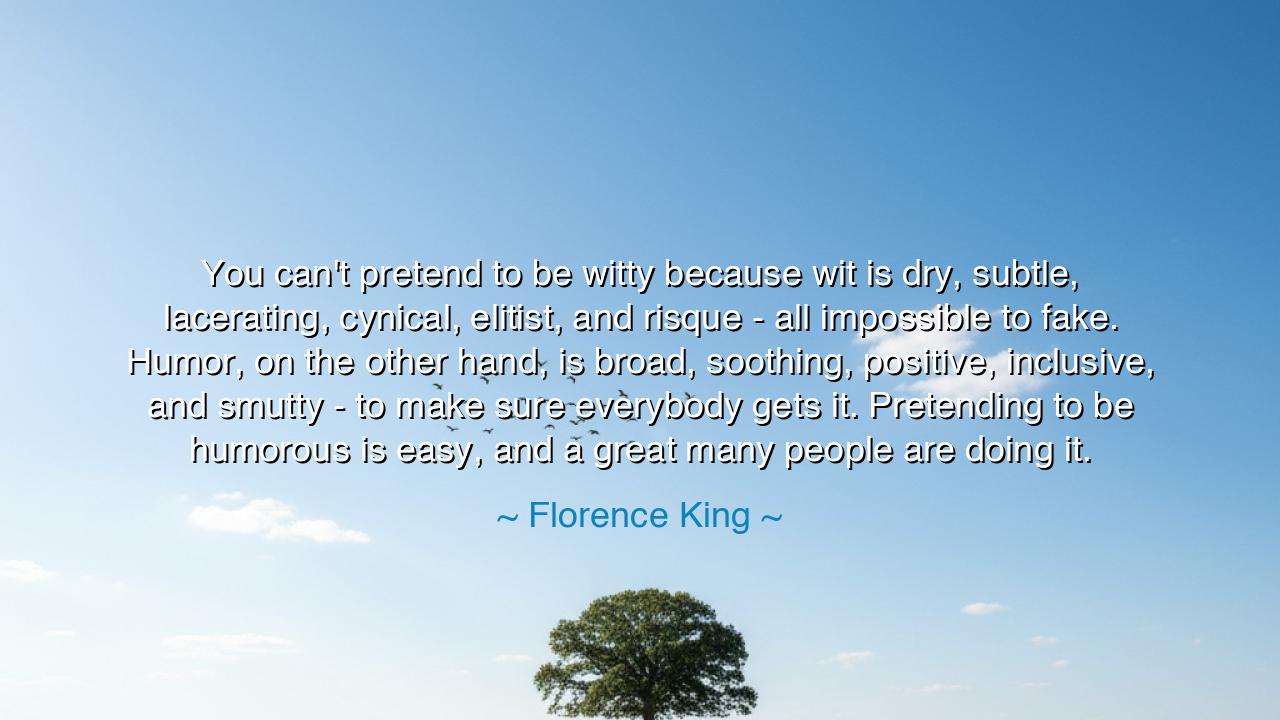
You can't pretend to be witty because wit is dry, subtle
You can't pretend to be witty because wit is dry, subtle, lacerating, cynical, elitist, and risque - all impossible to fake. Humor, on the other hand, is broad, soothing, positive, inclusive, and smutty - to make sure everybody gets it. Pretending to be humorous is easy, and a great many people are doing it.






The words “You can’t pretend to be witty because wit is dry, subtle, lacerating, cynical, elitist, and risqué — all impossible to fake. Humor, on the other hand, is broad, soothing, positive, inclusive, and smutty — to make sure everybody gets it. Pretending to be humorous is easy, and a great many people are doing it.” by Florence King are not merely an observation on comedy, but a profound meditation on truth itself — the difference between depth and imitation, between art and artifice. King, a master of sharp prose and fearless intelligence, speaks here as both critic and philosopher. Her words cut through pretense to remind us that wit — like truth, courage, and genius — cannot be feigned. One may imitate joy, charm, or kindness, but not wit, for wit is the voice of intellect sharpened by experience, and of irony refined by honesty.
To understand her meaning, one must first grasp the distinction she draws between wit and humor. Wit is the weapon of the mind — precise, piercing, and rare. It demands clarity, observation, and the courage to reveal what others conceal. Wit wounds, but it wounds for truth’s sake. It is dry, for it wastes no words; subtle, for it hides its power within refinement; lacerating, for it cuts through hypocrisy; cynical, because it sees too clearly the follies of mankind; elitist, not by arrogance, but by discernment; and risqué, for it dares to tread where timid souls dare not go. Wit cannot be faked because it springs from authentic insight, not performance. To pretend to be witty is like pretending to be wise — the mask always slips.
Humor, in contrast, is the laughter of the crowd — open, generous, and forgiving. It is inclusive, designed not to divide but to unite. Where wit isolates, humor gathers. Where wit bites, humor embraces. King’s words do not condemn humor; she acknowledges its power to soothe the human spirit. But she warns that humor, being broad and popular, is easier to counterfeit. One may mimic laughter, play at joy, or perform geniality without ever possessing the depth of true understanding. To pretend to be humorous is to chase approval, not truth. It is the smile without the substance — the applause of the many in place of the respect of the few.
This distinction is as old as civilization itself. In the courts of kings and the streets of Athens, there were always two kinds of jesters: those who spoke to please, and those who spoke to reveal. The latter were rare — philosophers in disguise. Socrates, who often used irony to expose ignorance, was a man of wit rather than humor. His subtle questioning cut more deeply than any sword, revealing truths his listeners did not wish to see. Yet those who merely mimicked him — who turned philosophy into mere banter — never reached the same power. They could imitate his tone, but not his insight. As Florence King reminds us, imitation can reproduce the surface, but never the soul.
Wit, therefore, demands courage. To be witty is to stand apart, to risk offense in the pursuit of truth. It is not for the timid or the flattering. The witty mind sees the absurdities of power, love, and faith — and dares to name them. Humor, however, offers comfort where wit demands clarity. Both have their place, but the danger lies in mistaking one for the other. A society that values only easy laughter will lose its sharpness; it will forget how to question itself. When all jest becomes softness, no truth remains to pierce through illusion. Florence King’s warning, though wrapped in irony, is a plea for intellectual honesty — for the preservation of real wit in an age that rewards the imitation of charm.
The ancient Romans understood this balance well. They revered Juvenal for his biting satire, which exposed the decadence of empire, but they also adored Plautus, whose comedies brought laughter to the people. Both served vital roles — one to awaken, the other to soothe. Yet Juvenal’s wit endured the ages not because it pleased his contemporaries, but because it revealed timeless truths. So too, Florence King implies, will those who wield wit with precision endure beyond the noise of those who only perform humor for praise.
And so, children of thought and speech, take this lesson to heart: seek wit, not merely humor. Let your words carry meaning, not mimicry. If you would make others laugh, let it be from recognition, not distraction. Cultivate the mind that observes before it amuses, that thinks before it charms. True wit cannot be learned, but it can be earned — through reflection, honesty, and a fearless love of truth. For as Florence King teaches us, laughter that flatters the crowd fades quickly, but wit that illuminates the soul will echo through the centuries, sharp, enduring, and free.






AAdministratorAdministrator
Welcome, honored guests. Please leave a comment, we will respond soon